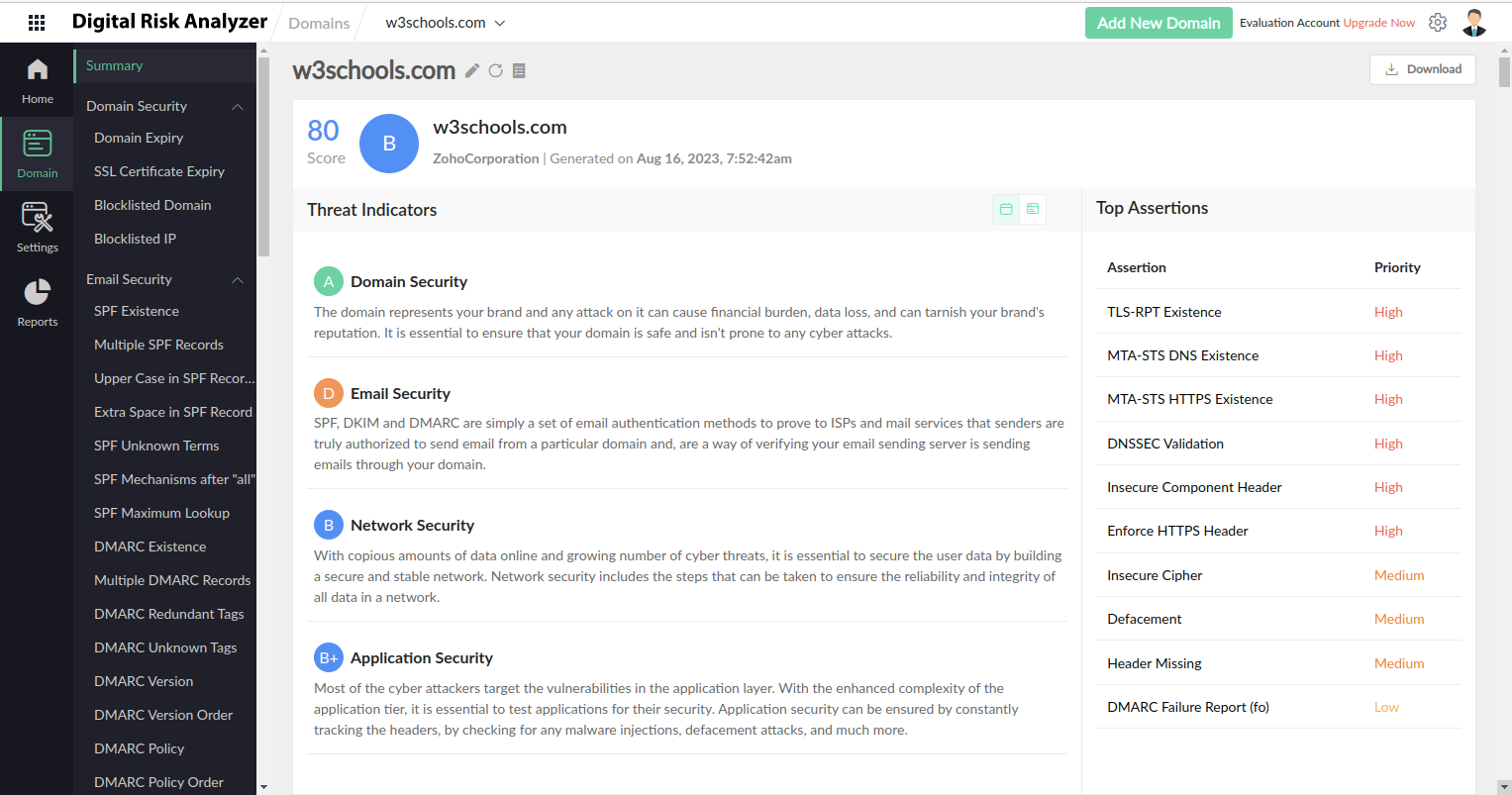Gauge your security posture and avoid cyber risks with Digital Risk Analyzer
Digital Risk Analyzer is an all-in-one risk assessment tool that helps organizations check their cyber security posture or assess the cyber risks posed by third-party vendors. This tool runs various assertion checks to assess and validate the email, domain, network, and application, and delivers an exhaustive report and rating score that can help you assess the security of your platform.
How does Digital Risk Analyzer work?
Digital Risk Analyzer is an easy-to-use tool that lets you assess your domain security in three steps:
- Add the domain you want to monitor.
- Schedule a scan frequency of your preference.
- Digital Risk Analyzer will run a scan and provide you the results.
Once the scan is completed, you'll receive a detailed report with information on essential aspects related to your domain security. The result will also include a Security Rating Score that will help you understand the security posture of your domain and assist you in tracing significant threats and creating an incident remediation plan.
Digital Risk Analyzer focuses on four areas of security:
 Obtain insights on four main security aspects with the help of assertion checks
Obtain insights on four main security aspects with the help of assertion checks Email security
Have you ever sent an important email that was never received? It can be highly frustrating when your emails go missing or end up in spam folders. Mitigate issues due to mail spoofing by adding records like DomainKeys Identified Mail (DKIM), Domain-based Message Authentication, Reporting & Conformance (DMARC), and Sender Policy Framework (SPF) to ensure that emails are sent from authenticated servers. By getting your SPF, DMARC, or DKIM records verified, you can confirm the integrity and availability of your mail servers.
Domain security
A secure domain is crucial to ensure your presence in the highly competitive web space. Aspects related to domain security, like the expiry of your SSL certificates or domain names, should be verified regularly. An expired SSL certificate can cause loss of customer trust or revenue, damage to reputation, and exposure to various vulnerabilities. On the other hand, an expired domain can lead to grave issues like domain thefts or hijacking. Avoid these issues by renewing your domains or SSL certificates before they expire, verifying your domains or IPs against popular blocklists, and taking other relevant security measures.
Network security
With large amounts of sensitive data being transferred over your network, you must be on guard against attacks that aim to steal your data. By using stronger algorithm-based encryptions in your network, you can safeguard data in transit. To ensure the highest security standards, you must ensure that your SSL certificates are valid, check the presence of insecure ciphers, and run DNSSEC validation checks.
Application security
Life has been made easier with the proliferation of easy-to-use applications, but these can also bring security challenges. When applications are placed in a labyrinth of cloud-connected networks, exposure to potential data theft and cyberattacks is high. Crucial data like credit card information or bank details are increasingly being stolen from vulnerable apps. Ensure your applications are safe by verifying that your domain isn't blocklisted, that it isn't hosting any malware unintentionally, and that the customers using your domain aren't susceptible to phishing attacks.
Why is Digital Risk Analyzer important for your organization?
- Ensure the integrity and availability of your mail servers by getting your SPF, DMARC, or DKIM records verified.
- Stay away from phishing attacks, domain thefts or hijackings, and domain spoofing by renewing your domains or certificates on time and verifying your domains against popular blocklists.
- Mitigate cyber threats that can impact your network by using high-security standards like encryption or by running DNSSEC validation checks, certificate validity checks, or insecure cipher checks.
- Safeguard critical data in your applications from data theft or cyberattacks by cross-checking your domains with a list of blocklisted URLs or by scanning for malware or phishing.
Read our help documentation to know more about Digital Risk Analyzer. Do you have any comments, questions, or suggestions? We're all ears! Contact support or add your feedback in the comments below.
Topic Participants
Bela Susan Thomas
Kontokontakt
muthukumar
Paul Youngberg